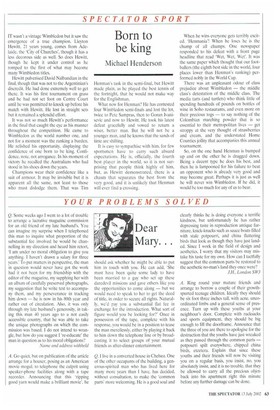Dear Mary. . .
Q. Some weeks ago I went to a lot of trouble to arrange a lucrative magazine commission for an old friend of my late husband's. You can imagine my surprise when I telephoned this man to inquire what proportion of the substantial fee involved he would be channelling in my direction and heard him retort, 'I am under no moral obligation to give you anything. I haven't drawn a salary for three years.' To put matters in perspective, the man in question would never have got the work had it not been for my friendship with the editor of the magazine, my supplying her with an album of carefully preserved photographs, my suggestion that he write text to accompany: them, and my perseverance in tracking him down — he is now in his 80th year and rather out of circulation. Also, it was only through my late husband's generosity, in taking this man 40 years ago to a not easily accessible country, that he was able to take the unique photographs on which the commission was based. I do not intend to wrangle, but how do you suggest I 're-educate' the man in question as to his moral obligations?
Name and address withheld A. Go quiet, but on publication of the article arrange for a hoaxer, posing as an American movie mogul, to telephone the culprit using speaker-phone facilities along with a tape recorder. Announcing that this 'ripping good yarn would make a brilliant movie', he
should ask whether he might be able to put him in touch with you. He can add, 'She must have been quite some lady to have been married to a guy who set up these daredevil missions and gave others like you the opportunities to come along — but we would need to speak to her to get the deed of title, in order to secure all rights. Naturally, we'd pay you a substantial flat fee in exchange for the introduction. What sort of figure would you be looking for?' Once in possession of the tape, complete with his response, you would be in a position to tease the man mercilessly, either by playing it back to him down the telephone line or by broadcasting it to select groups of your mutual friends as after-dinner entertainment.
Q. I live in a converted house in Chelsea. One of the other occupants of the building, a generous-spirited man who has lived here for many more years than I have, has decided, without consultation, to make the 'common parts' more welcoming. He is a good soul and
clearly thinks he is doing everyone a terrific kindness, but unfortunately he has rather depressing taste in reproduction antique furniture, knick-knacks such as sauce boats filled with stale potpourri, and china fluttering birds that look as though they have just landed. Since I work in the field of design and aesthetics, I worry that my visitors may mistake his taste for my own. How can I tactfully suggest that the common parts be restored to the aesthetic no-man's land they once were?
J.H., London SW3 A. Ring round your mature friends and arrange to borrow a couple of their growthspurted teenage children. Ideally they should be six foot three inches tall, with acne, uncoordinated limbs and a general sense of presence. Turn up with these youths at your neighbour's door. Complete with rucksacks and sports equipment, they should be big enough to fill the doorframe. Announce that the three of you are there to apologise for the destruction that the youths have just wreaked as they passed through the common parts — potpourri spilt everywhere, chipped china birds, etcetera. Explain that since these youths and their friends will now be visiting you on a regular basis, you insist, no, you absolutely insist, and it is no trouble, that they be allowed to carry all the precious objets back into his apartment right this minute before any further damage can be done.


































































 Previous page
Previous page